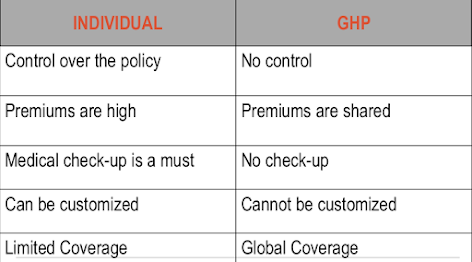
Coverage The guarantee against specific losses provided under the terms of an Insurance
company.

Benefits are specific areas of Plan coverage’s, i.e.Outpatient visits, Hospitalization and so forth; those make up the range of medical services that a payer markets to his subscribers.
Rider This is an attachment to the policy that modifies its conditions by expanding or restricting benefits or excluding certain conditions from coverage.

called Premium.

- Individual health insurance covers the medical expenses of only one person or family.
- Unlike group insurance, you purchase individual insurance directly from an insurance company.
- When you apply for individual insurance, you are evaluated in terms of how much risk you present.
- This is generally done through a series of medical questions and/or a physical exam.
- Your risk potential determines whether you qualify, and how much your insurance will cost.
- Individual insurance is somewhat more risky for insurers than group insurance, since group insurance allows the insurer to spread risk over a larger number of people. For this reason, individual insurance is generally more difficult to obtain, and more costly than group insurance.
- To get individual insurance, you can either contact the insurer directly, or get in touch with your insurance agent.
- You will probably want to get quotes from several insurance companies before you choose one, just to make sure you are getting the best coverage for your money.
- Before issuing an individual insurance policy, the insurer willwant to know everything about your personal health history.
- Many insurers use information from the Medical Information Bureau to determine whether an applicant is insurable.
Features of Individual Health Plans
- Single Owner
- Dependant Coverage
- Stringent Medical Check-up
- High Premiums
- Customized Policy
- With group health insurance, a single policy covers the medical expenses of many different people, instead of covering just one person.
- Often, your employer or association pays at least part of the cost of group insurance. But when you purchase individual insurance, however, you are responsible for 100% of the cost (High Premiums)
- Individual insurance often doesn't provide as much coverage as group insurance policies in the same price range (Customized Policy)
- Moreover, individual insurance is often more expensive to make up for the insurer's increased risk exposure.
- Individual insurance coverage is, ironically, much easier to come by when you are healthy.
- If you are already sick or have a history of health problems, you may find it difficult to obtain coverage.
- Group insurance, by contrast, is usually available without taking a medical examination or answering health questions.
- Unlike individual insurance, where each person's risk potential is evaluated to determine insurability, all eligible people can be covered by a group policy, regardless of age or physical condition. The premium for group insurance is calculated based on the characteristics of the group as a whole, such as average age and degree of occupational hazard.
- Unlike individual insurance, where each person's risk potential is evaluated to determine insurability, all eligible people can be covered by a group policy, regardless of age or physical condition. The premium for group insurance is calculated based on the characteristics of the group as a whole, such as average age and degree of occupational hazard.
- You don't need a physical exam.
- Under a group health insurance arrangement; the insurance company agrees to insure all members of the group, regardless of current physical condition or health history.
- The only condition is that the group members must apply for insurance within a specified eligibility period.
- Clearly, this is better for those with chronic health conditions, who might be unable to get individual insurance.
- Many employers offer group health insurance as part of their employee benefits package.
- Other groups that may offer insurance coverage include churches, clubs, trade associations, chambers of commerce, and special-interest groups.
- You can't customize your policy
- In a group insurance situation, the provisions of the policy are negotiated between the insurer and master policy owner(usually an employer or association).
- You don't have the freedom to have provisions included or excluded, and your deductible amount and co-payment percentage are determined in advance.
- In some situations, however, you may be able to choose between two or more insurance plans.
- In large companies, however, even customizing the plans as per the requirement of the employees is possible.
- Group Owners
- Dependant Coverage – may be provided
- Global Coverage
- No Medical Check-ups
- Premiums are shared
- No customization offered

Group Health Plans
There are categories of Group plans:
EGHP - Employer Group Health Plan
The Employer Group Health Plan is a health plan offered to the employees through the employer.
LGHP - Large Group (Employer) Health Plan
- The Large Group Employer Group Health Plan is a health plan promoting this plan would be employing more than 100 employees or among the employers who have come together at least one of them would be employing >/= 100 employees
SGHP - Small Group (Employer) Health Plan
- The Large Group Employer Group Health Plan is a health plan promoting this plan would be employing more than 100 employees or among the employers who have come together
- at least one of them would be employing >/= 100 employees
- This is a plan rolled out by an employer employing less than 20 employees.
- It is a policy that combines the coverage offered in Basic and Major Medical Plans.
- The premiums of these plans are high. Comparatively lower co-insurance.
- The subscriber is required to pay a co-insurance of 20% on the medical expense incurred.
- The concept of Stop-Loss Clause is predominant in Commercial Plans.




0 Comments
Please do not enter any spam link in comment box.